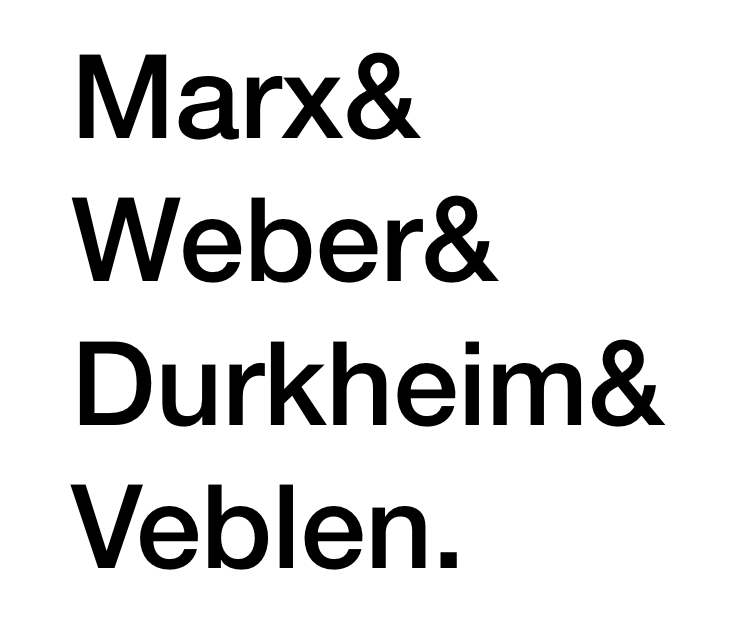I love this episode on Supreme and streetwear from Patriot Act with Hasan Minhaj, especially for the explainer on conspicuous consumption with a nod to “O.G. Hypebeast” Thorstein Veblen.
Veblen’s The Theory of the Leisure Class is a classic on how people use wealth and taste to make status, and conspicuous consumption is a good way to explain how hype happens. It got me thinking about other classic sociological explanations for how luxury brands blow up.

Marx’s idea of commodity fetishism is also important for understanding luxury brands and other Veblen goods. While conspicuous consumption focuses on why people buy, this idea gets to the core of how these goods get associated with status. We often venerate all the labor that supposedly goes into a luxury product, like a fancy watch, or we venerate the creative processes in branding or appropriating ideas. For Marx, the important part is that we transfer the value of that labor into the product and treat the product like it just has that value on its own.
This is the reason why the products of labour become commodities, social things whose qualities are at the same time perceptible and imperceptible by the senses. In the same way the light from an object is perceived by us not as the subjective excitation of our optic nerve, but as the objective form of something outside the eye itself…There it is a definite social relation between men, that assumes, in their eyes, the fantastic form of a relation between things.
Karl Marx. 1887. Capital: A Critique of Political Economy. Volume 1
Marx goes on to compare this process to the development of religious beliefs, and here we could also look at Émile Durkheim and collective effervescence. Part of the reason these products get hype is that they create big social events around shopping. The long lines and limited edition “drops” force people to get together in large crowds at special times to get the product. This makes shopping less of an individual experience and more of a collective one, where just being in the crowd contributes to the excitement.

All these theories make an important point about the social dynamics of popular products. As Matt Powell says in an interview earlier in the episode, you can’t take hype to the bank. But maybe you can; the generation of hype isn’t just an ephemeral, “fake” thing, but an example of a core truth in sociology—if people define hype as real it is real in its consequences.
Evan Stewart is an assistant professor of sociology at University of Massachusetts Boston. You can follow his work at his website, or on BlueSky.
Comments 19
Doug Hartmann — June 7, 2019
Great stuff, SI! Hallett, Stapleton, and Sauder have a new ASR piece on the "careers" of public ideas from contemporary social scientists that bears mention here too. Those they analyze include: the bell curve (Herrnstein and Murrary) bowling alone (Putnam); the creative class (Florida); the overworked American (Schor); clash of civilizations (Huntington); culture of fear (Glassner); and the second shift (Hochschild).
ddfasmsdsdsa Smith — September 20, 2019
dsfdscThank you so much for this. I was into this issue and tired to tinker around to check if its possible https://notepad.software/ but couldnt get it done. Now that i have seen the way you did it, thanks guys
with
regards
ddfasmsdsds — September 20, 2019
Tdcdschanks for https://filezilla.software/ sharing.I found a lot of interesting information here. A really good post, very thankful and hopeful that you will write many more posts like this one.
vex 3 — June 5, 2020
The blog is very informative and outstanding. I would love to read your blog. Give me lots of useful information. I will often visit your blog.
vin lookup
Charlie — July 17, 2020
Well, you take a good step for your users that you start video series with it. The russhessays.com also starts this series and I hope they keep doing work on it so we make things easy for ourselves.
mark wood — January 28, 2021
An obligation of appreciation is all together to share the data, continue doing magnificent... I really savored the experience of exploring your site. incredible resource...
Cinema HD APK
MediaBox HD
HSC Short Syllabus — February 6, 2021
Noakhali Science and Technology University Admission 2021 information has been Published on Noakhali Science and Technology University Official website nstu edu bd.
Ryan A Mitchell — December 10, 2021
This is a great idea to share your blogs with us because your Article helps us to learn so many things through your blogs. Thank you so much admin for uploading such amazing content with us your blog is really helpful for me. wish you all the best for upcoming comments.
floating staircase — December 29, 2021
A few property holders incline toward stone for the proceeds yet one disadvantage with stone is that it is an exceptionally weighty material which might bring about unnecessary burden on the heap bearing component, be it the divider or a stringer. Support the drifting impact of the drifting flight of stairs by joining disguised lighting beneath each track. Here in this model, simply perceive how the diffused lighting gives a sensational seem to the drifting flight of stairs.
floating staircase — December 29, 2021
A few property holders incline toward stone for the proceeds yet one disadvantage with stone is that it is an exceptionally weighty material which might bring about unnecessary burden on the heap bearing component, be it the divider or a stringer. floating staircase Support the drifting impact of the drifting flight of stairs by joining disguised lighting beneath each track. Here in this model, simply perceive how the diffused lighting gives a sensational seem to the drifting flight of stairs.
Harry Kane — August 9, 2022
I can see a lot of interesting information cuphead.
ward rose — September 23, 2022
In contrast, "we find everyone reliant" in a feudal society, including serfs and lords, vassals and suzerains, laypeople and clergy. Because "There is no need for labor and its products to take on a fabulous form that is separate from their reality because relationships cookie clicker of personal dependency establish the existing social foundation. They manifest as services in kind and payments in kind in social exchanges ". In contrast to the abstract universal equivalent required for the manufacture of commodities, transactions in medieval society focus on the specificity of labor.
john — April 27, 2023
very fascinating data about style you can attempt aviator bomber jacket b3
edpost.in — May 13, 2023
Our team is made up of professional writers and citizen journalists with a wide range of journalism interests who are passionate about reporting Education Updates with transparency in the general public interest. edpost is an edpost.in initiative of professional writers who have banded together to provide devoted news coverage of current events in India.
SMM Panel One — July 15, 2023
Boost your social media game without breaking the bank with our Cheap SMM Panel. Say goodbye to costly marketing strategies and hello to affordable yet effective social media promotion. Our panel offers a range of budget-friendly services, including likes, followers, comments, and more, tailored to suit your specific needs across popular social media platforms.
Holden — September 4, 2023
Also, I assume that many students suffer from getting bad grades of essay task. I also had the same trouble when I was a student and this site clevescene.com significantly helped me to get rid of all the troubles. Therefore, if you also want to solve your problems with essay, just open the link and use it for yourself!
SMM Panel — September 18, 2023
When it comes to choosing the best SMM panel this one is the clear winner. It's a game-changer for my business! I love the user-friendly interface of this SMM panel. Ordering likes, followers, and comments has never been easier. I've tried several SMM panels, but this one truly stands out as the best in terms of quality and reliability.
Anonymous — October 19, 2024
Thanks for sharing this information
cherybomb — January 13, 2026
Great point—Marx really nails how we project value onto things instead of the people behind them. Luxury branding is like Slope Rider: the object itself is simple, but the story and hype make it feel way more powerful than it actually is.